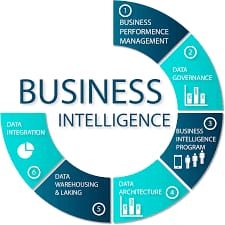Latest News
How To Use Business Intelligence To Boost Your Marketing Efforts

Marketing can be a double-edged sword. If done right, you can reap great benefits, but if there are gaps in your understanding about your target audience or even the messaging, all the investment and effort go down the drain. Business intelligence tools can help you streamline your marketing efforts and make sure that you get the results you’re looking for.
In the age of the Internet, and more so in the age of digital marketing, marketing has become data-driven. And data is the soul of business intelligence.

What is business intelligence software?
Business intelligence, or BI software, is a set of tools that allow you to collect, transform, analyze and report data so that you can base your critical business decisions based on it. The power of BI software lies in its ability to analyze huge amounts of data and recognize patterns that may not be visible to the human eye. Business intelligence tools are extensively being used by e-commerce companies to predict buying patterns of their customers and then promote or stock their products accordingly. BI tools can automatically generate sales and delivery reports from your CRM data.
There are numerous business intelligence services that can build you custom BI tools or provide you cloud-based services. A business intelligence agency can build you a dashboard through which you can drive the entire data strategy of your enterprise.
The role of BI tools in marketing
The purpose of every marketing effort is to get the biggest bang for your buck, that is, generate as many leads and sales as possible with the amount of money you are spending. You need to continuously optimize your marketing strategy, and nothing helps you more to optimize than data.
Your marketing effort may involve various stages of a funnel. Every stage has its own key performance indicators. The success of the stage B in your funnel depends on the performance of stage A, and the performance of the stage C of your funnel depends on how the stage B performs. In between, according to the performance metrics, you may need to make certain strategic changes to a particular stage.
Take for example search engine optimization, which is a subset of your digital marketing strategy, which is again a subset of your entire marketing effort.
Your business intelligence tool tells you what your current standing is vis-à-vis your search engine rankings. How many visitors are you getting every day? On which days of the week do you attract more traffic and which keywords get you the most traffic?
Then you carry out some optimizations. You add new content. You obtain quality back links. You re-purpose your content. You make changes to your existing content. You notch up your efforts on social media platforms.
What changes does your BI tool show you? Has there been an increase in traffic for the right keywords? Are your optimization efforts impacting you positively or negatively? Are you targeting the right keywords? Have the recent improvements in your rankings had an impact on the number of sales? When you publish new content, exactly on which days of the week does your traffic go up, and what is your ROI?
This is just one example of using business intelligence tools to analyze data and then streamline your marketing strategy.
A business intelligence system, when used for marketing, can tell you where you may be wasting money and where you should put more effort. These changes are not possible without analytics.
How do BI tools impact individual marketing efforts?
Competitor analysis
This is a big part of marketing. How many marketing campaigns has your competitor run? Which products the competitor is focusing on more? Has there been a sudden spike in the social media updates of your competitor? How many media channels and platforms is your competitor targeting? What sort of messaging is your competitor using? What sort of engagement is your competitor attracting from its followers? There are many cloud-based business intelligence tools that can give you this information.
Predictive analytics
This aspect of business intelligence tools gives you the power to see the future and then make strategic shifts based on that knowledge.
Suppose you want to implement a seasonal marketing strategy for the upcoming festive days. There are multiple platforms to target, and you have a limited budget. Your business intelligence tool can use historical data and tell you which is the most effective platform for your target audience for that specific festive season. Different festive seasons may have different platforms.
Predictive analytics and marketing can help you with
- Allocate budget to marketing campaigns.
- Obtain actionable insights for subsequent marketing campaigns.
- Plan automatic campaigns based on predictive patterns.
- Reassess budgets for less performing campaigns.
- Alter the messaging based on subtle cues.
- Use the previous sales data to up or down your marketing efforts and budgets.
Set marketing goals with product-related data
Sometimes, marketing can be successful but there is some problem in the supply chain or production. You can use BI tools to assess the availability of the items that you intend to promote through your marketing campaigns and streamline your efforts accordingly.
A simple example: you want to promote your company’s sunscreen on your e-commerce website. The campaign is successful, but there are not enough sunscreens to sell. You need to turn away your customers. Your marketing has succeeded, but the lack of the product has thrown a spanner in the works. On the other hand, if you have production and supply data with you, instead of focusing on sunscreen, you can market the dandruff shampoo that is abundantly available at your warehouses.
Customer and market analytics churned out by your business intelligence tools can help you tune your marketing. Please remember that it is not always about the success or failure of your marketing campaigns. Even if sometimes your marketing campaigns succeed, there is no coordination between different departments and the success cannot be leveraged. Business intelligence unleashes data from the clutches of departmental silos and gives you a collective intelligence that helps you draw maximum mileage out of your marketing strategy.
Harper Harrison is a reporter for The Hear UP. Harper got an internship at the NPR and worked as a reporter and producer. harper has also worked as a reporter for the Medium. Harper covers health and science for The Hear UP.










